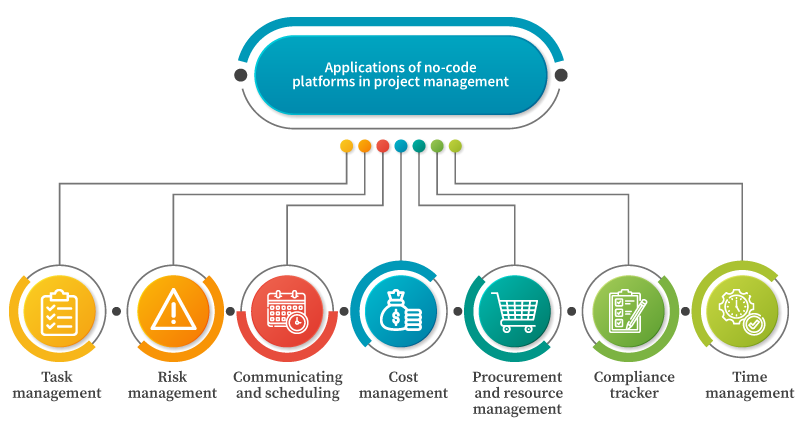
According to Henry Mintzberg, management is a practice where art, science and craft meet.
Say goodbye to complex coding and hello to streamlined success! Explore how non-technical teams can achieve efficient project delivery with simplified tools and automation, maximizing productivity and collaboration. Learn how you can revamp project management with no-code platforms can help you out!
Project managers are expected to master art, science, and craft to achieve defined business goals all throughout the year. From organizing work to leading teams to reporting on the project, the role of a project manager is complicated and endless.
Project management includes simultaneously and actively managing the following processes-
- Create new projects and goals
- Effectively assign tasks
- Organize and communicate with team members
- Monitor the project’s progress in real-time
Traditional forms of management, such as emails, spreadsheets, whiteboards, and notepads, alongside assigning tasks verbally, may suffice for small teams temporarily. But in the long run, spreadsheets start to overflow, logs get lost, and all these complications will eventually lead to chaos. A project manager must make use of the best tools and software available to oversee the nitty-gritty of business while trying to achieve business goals.
Speaking of software and tools, ready-to-use project management software is inflexible and expensive. These platforms fail to cater to the needs of the manager and organization which in turn leads to inefficiency. The one and only solution, in this case, is a customizable no-code platform.
Explore: Quixy for Project Management
No-code platforms automate repetitive project management processes. The best part of no-code platforms or software is that the processes can be designed and edited by a non-IT professional or an employee. Employees or managers can create a customizable application as they know their requirements and needs the best. These tailor-made platforms can be edited from time to time when required. A consolidated view of everything under one dashboard leads to time and cost-efficiency.
Also read: 5 ways to achieve Success with No-code Low-Code
Traditional vs No-Code Project Management: A Comparison
Traditional Project Management
- Reliance on manual processes: Heavy reliance on spreadsheets, Gantt charts, and physical documentation.
- Time-consuming and error-prone: Manual tasks can be time-consuming and prone to human error.
- Limited collaboration: Challenges in real-time collaboration and communication among team members.
- Difficulty in scaling: Scaling projects and teams can be difficult due to manual processes.
Also Read: Project Management Strategy: Discover the Key to Project Success
No-Code Project Management
- Automation of tasks: Streamlines workflows and reduces manual effort.
- Real-time visibility: Provides real-time insights into project progress, resource allocation, and potential issues.
- Enhanced collaboration: Facilitates seamless communication and collaboration among team members.
- Scalability: Easily adapts to changing project requirements and team sizes.
- Customization: Allows for customization to fit specific project needs and workflows.
Applications of No-Code Platforms in Project Management

1. Task Management
To make sure the employees work efficiently, managers need to create, assign, and manage tasks within a timeframe.
Project management with no-code platforms allow managers to manage both milestone-based activities and day-to-day activities. With these softwares and tools, managers can create tasks and automate repetitive tasks to enable simple workflows. Features such as inbuilt notifications and reminders assist managers in assigning and monitoring the workload shared among different employees. With just one click, instant access to the status of all tasks across any device can be accessed.
Also Read: What is Organizational Change Management?
2. Risk Management
Project management software helps managers identify risks of any size that could potentially cause damage to the workings of the organization. Once managers identify these risks, they can easily create contingency plans in place and communicate the change in plans within seconds through the application. Each and every team member involved will instantly be up-to-date with the changes made and can work accordingly.
Also Read: Construction Management App: 7 Ways to Boost Your Efficiency
3. Communicating and Scheduling
With the different stages such as planning, executing, and monitoring, managers cannot afford miscommunication and confusion.
A no-code platform with the option of integrated communication is what will allow managers to identify who needs to get which message when and decide on the best method of communication.
Project managers can use no-code applications to schedule and conduct meetings with different teams. They can make use of no-code applications to capture and communicate the decisions and actionable plans of the meetings through notification and reminders to the team members.
Also Read: Project Management Simplified for Non-Project Managers
4. Cost Management
Inefficient excel based budget spreadsheets do not allow managers to measure the actual cost and expenditure of projects. No-code applications are a step ahead of the game as they help managers in keeping track of the actual expenditure will allow them to have control and make necessary changes while keeping it within the agreed budget.
Automation of these finance processes and workflows will lead to accurate, real-time data for actionable insights. A custom dashboard with the reports and charts will provide managers with insights that they need for efficient tracking and decision making.

5. Procurement and Resource Management
Procurement and resource management involves purchasing, renting, or contracting outside resources that are necessary for the completion of a project. For the smooth procurement of these resources, managers have to establish a good relation and workflow with various vendors and suppliers.
Project managers can access a consolidated view of all procurement data on the go. Automation of purchase order processes, vendor management, invoices, and more will have a positive impact on the team’s overall performance and enhance value.
Through paperless automated forms, managers can connect and streamline procurement data and eliminate bottlenecks in procurement processes. An easy-to-use, customizable vendor management platform will transform the way managers perform vendor onboarding, registration, and qualification and will keep them updated on approved contracts and payment status.
Also read: 5 Procurement Automation Processes to Embrace Today
6. Compliance Tracker
Project managers can upgrade and maintain the quality of their projects by automating quality assurance processes. A compliance tracker tool within the no-code applications will enable the quality team to report compliance issues. Route workflows based on type, severity, or other parameters will allow managers to stay up to date with the status of reported issues at any time.
7. Time Management
“Until we can manage time, we can manage nothing else.”
Peter Drucker
Once the tasks, goals, and deadlines have been assigned, it is critical for the project manager to make sure that the work is done within the right time while it is being executed. Staying on track is what will lead to efficiency and greater productivity.
Project managers can easily manage time by capturing the exact time spent on various project activities such as project tasks, training, R&D, and meetings. Agile project management platforms allow managers across workflows to view insights into overall project costs and team productivity with custom reports and dashboards with drill-down capability.
A project manager is responsible for keeping track of team members or contractors’ hours is part of. No-code platforms will proved them tools that can track hours and then approve these hours to make sure the employees are paid on time for the work they’ve done.
Also Explore: The Power of Quixy Sandbox for Business Success
Conquering Project Management Challenges with Quixy
Project management, while essential for organizational success, often faces numerous challenges that can hinder efficiency, productivity, and overall project outcomes. Some of the most common challenges include:
- Inefficient communication and collaboration: Silos within teams, lack of real-time updates, and difficulty in sharing information can lead to delays and misunderstandings.
- Manual processes and paperwork: Time-consuming manual tasks, such as creating reports, tracking progress, and managing resources, can reduce productivity and increase errors.
- Limited visibility and control: Lack of real-time insights into project progress, resource allocation, and potential risks can make it difficult to make informed decisions.
- Complexity and scalability: Managing large-scale projects with multiple stakeholders, dependencies, and changing requirements can be overwhelming.
- Resource constraints: Limited budgets, time, and personnel can hinder project execution and delivery.
To address these challenges and improve project outcomes, organizations need a powerful and flexible project management solution. Quixy is a no-code platform that offers a comprehensive suite of features to streamline project management processes and drive efficiency with its rapid app development capabilities and effortless management.
Also Read: The Hidden Cost of Inefficient Project Management(and How to Fix It Fast)
Conclusion
Since project management demands a great deal of organization, structuring, and monitoring, it is important to equip project managers with an easy-to-use, tailor-made platform to smoothen their multi-tasking. It is now clear that no-code platforms assist project managers in assigning tasks, identifying risks, collaborating, managing costs and time, and more. With superpowers such as automation, managers can measure and manage what matters and take the organization to the next level.
Now coming to the question: Which is the best no-code platform for project management?
The answer is simple- Quixy.
With Quixy, project managers with no technical skills can create ready-to-use apps and customize them according to their projects. These automated processes can help improve efficiency, productivity, and transparency in the project, which will drive success.
Using Quixy, Patanjali, a leading renewable energy service provider, has streamlined it’s lead management and management processes. With efficient logging, allocation, and tracking of tasks, the utilization of its field staff has improved by an impressive 40% while reducing the cost related to manual task allocation and tracking. Automation has increased transparency and accountability in operations.
Get started with our platform, and experience the ease of automated processes and personalized app building.
Frequently Asked Questions(FAQs)
Q. How does No-Code benefit project management workflows?
No-code tools enable rapid prototyping, customization of project tracking systems, and automation of repetitive tasks, resulting in quicker project delivery and improved team productivity.
Q. Who can utilize No-Code for project management improvements?
Project managers, team leaders, and members looking to streamline workflows and customize project tools can utilize No-Code platforms without relying on extensive coding skills.
Q. What are some examples of No-Code applications in project management?
No-Code tools can create custom project dashboards, task trackers, automated notifications, and collaboration hubs, facilitating smoother communication and organization.
Q. How can you revamp project management with no-code methodologies?
No-Code empowers teams to adapt swiftly, iterate on project tools as needed, and democratize the creation of management solutions, leading to agile project methodologies and enhanced project outcomes.
Q. Is coding knowledge necessary to use No-Code platforms for project management?
No, No-Code platforms are designed specifically for users without coding expertise. They offer intuitive interfaces and drag-and-drop functionalities, enabling anyone to create and customize project management solutions effortlessly.
Login
Please login to comment
0 Comments
Oldest















